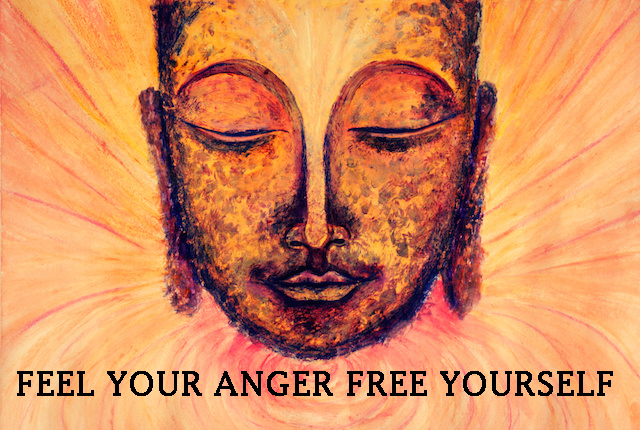FEEL YOUR ANGER FREE YOURSELF

You may think that suppressing your anger is good for others and yourself. Yet, it is actually the opposite. The more you deny your anger, the more disservice it becomes. Sooner or later, by repressing anger, anger is pushed into your unconscious and operates you without your awareness to becomes destructive.
There are many reasons why we don’t allow ourselves to feel anger. In some cultures, or families, expression of emotions, especially, anger, indicates weakness. Maybe anger was dangerous, or an indication lack of safety. But again, it becomes detrimental to your own wellbeing. Yes, it may not be easy to feel anger, but it can definitely possible and even necessary.
The renowned psychiatrist Rabbi Abraham Twerski tells a story about the consequences of avoiding unpleasant feelings. One day the faucet in his laundry room began leaking, and he called a plumber. The plumber explained that since Rabbi Twerski’s house was old, the valve had probably not been used for a very long time and thus had become frozen. He added that the only way to fix the faucet was to turn off the main valve that controlled the water to the entire house. After further inspection the plumber reported that the entire pipe was eroded and needed to be replaced. He completed the work and turned the valves back on again. From then on, every time Rabbi Twerski turned on a faucet anywhere in the house, there was an initial explosive discharge of rusty water, which gradually resolved into a clear, smooth flow.
If we do not acknowledge or express our feelings, for whatever reason (fear, pain, trauma, or social stigma), we can become detached from them. It’s as though we’ve turned off the main valve of our entire emotional system, preventing us from feeling pain and anger, but also keeping us from experiencing joy or happiness. After a while, it become a habit not to feel, and when we do dare to turn on the faucet, the burst of pent-up emotion may be frightening.
Imagine trying to stop a stream of water with your hands. Your hands don’t slow the flow of the water, but instead force it to move faster around your hand. In a similar way, anger will flow even if you try to block it. Once you allow yourself to feel your anger, you can balance it and redirect its power constructively. Yes, it might be uncomfortable to experience the anger, but it will not be as unpleasant as stopped-up energy. The attempt to control anger is what leads to those overwhelming sensations, as if a dam is about to burst.
Anger that is not faced and dealt with directly can often lead to other problems including feelings of anxiety, depression as well as acting it out, like passive aggressive behaviors. So, you better learn how to be angry rather than pretending not to be. The key is to shift from being reactive to mindful, and respond to the anger rather than reacting to it.
Anger is an important emotion that keeps our boundary protected. When we are angry, we feel frustrated, wronged or dismissed. It points out our need to be seen, validated and loved. Allowing yourself to feel the anger is the gateway to connect to your deepest needs. In this way feeling anger and exploring it can be a necessity to our wellbeing.
Anger pushes you to reset your boundaries and restore your sense of self. It gives you the motivation and energy to protect yourself and respond effectively to others. If necessary, anger can help you enforce your boundaries. When your boundaries have been violated, it is important to feel your anger. If you don’t feel your anger, it cannot serve its protective purpose, you may allow yourself to be manipulated, taken advantage of, or victimized. Without boundaries, you would have no shield.
Changing your habitual response to anger starts with welcoming anger and being willing to experience it. It requires you to let yourself feel your anger. You can start by being aware that there is an angry kid inside of you who wants his way. The more you ignore this kid or silence this kid, the more it will act out in other unpredictable, harmful ways. So, pay attention to this kid, listen to his/her need or the pain that’s underneath the anger. Most likely it’s sadness, grief, fear or disappointment. The present feelings probably come with triggering memories. If you can bring these memories and allow yourself to feel the painful emotions that you experience in the past and bring them to consciousness, you can work through whatever it was that initially hurt you and come back to the present day with a less charge and intensity, which in turn would allow you to tackle it head-on.





